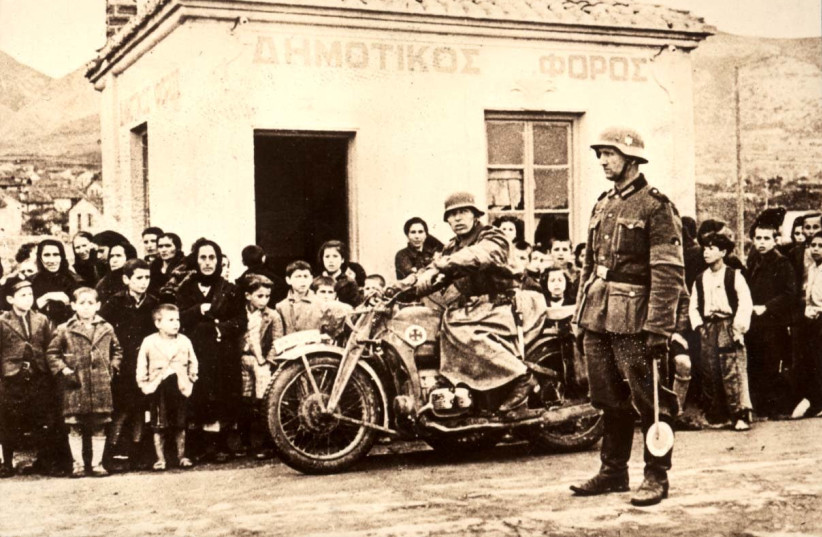Michael Matsas presents his readers with an updated and expanded version of his groundbreaking memoir, which he rightly calls The Illusion of Safety.
It is an uncommon memoir of his youthful experiences in occupied Greece during 1943 and 1944, with a description of life in a primitive yet hospitable mountain village running messages for the partisans only slightly older than him alongside his parents, who also survived. These adventures entertained his young daughters, who were curious about the war years.
As they grew older, he began to tell of his extended family, the extended tribe of Matsas in Ioannina and western Greece, rounded up by the German occupiers and sent in cattle cars to Auschwitz, where nearly all were killed on arrival.
He and his father researched national archives and libraries, in private archives, especially the Roosevelt Library in Hyde Park, and translated the hundreds of letters he wrote to fellow Greeks, survivors of the camps and mountains and members of the resistance still living in Greece, Israel and the United States. He voraciously read scholarly literature on the Holocaust and was shocked at his findings.
This expanded edition by a self-taught historian is replete with restrained anger, pathos and praise. It is a monument penned in the words of those who lived through the war years, the heroes and villains. It is the most comprehensive, informative and easily read story of the Greek Jews during World War II.

His anger and sadness are paramount throughout the book. He emphasizes the abandonment of the Jews, a theme developed later by many scholars, that no one warned the nearly 80,000 Jews scattered through the major and minor towns of Greece that the Germans were intent on deporting them to their deaths.
The BBC, still sometimes accused of bias on various issues related to Jews and Israel, never mentioned the danger in the news bulletins that trickled through the clandestine radios. The British liaison officers and the American agents, most of them American-Greeks who fought and led among the partisans, never mentioned or even knew of the ongoing Holocaust. Even the agents of the Palestinian Yishuv who helped to rescue Jews escaping to Turkey were silent about the deaths of the deported men, women and children.
Matsas excoriates the Allies for their silence and supports his anger with official documents from top secret files now available to scholars and the public still ignorant of the fate of Greek Jews. It is a shocking record of silence that includes Pope Pius XII, Roosevelt, Churchill and Stalin, and even the Jewish leaders of Palestine. This silence is a damning reminder of the two millennia of animosity toward the Jews and Israel.
Even pre-Israeli statehood Arab hatred is represented, with the story of grand mufti Amin al-Husseini, who advised Hitler and tried to organize Balkan Muslims to fight in the war.
The book chronicles the destruction in three zones of occupation under the Germans, Bulgarians and Italians. Of the many worldwide instances of massacre during the war only the Jews were especially marked for annihilation. There were many saviors but too few survivors.
The author presents the stories of camp survivors that he collected, as well as those of resistance fighters including the heroic doctors, translators, spies, and local leaders. It is a tour de force not matched in the literature of Greek Jewry. This expanded edition contains new stories reminiscent of the ancient Greek motto “Freedom or death.”
But even these heroes were betrayed by history. Not only were their stories and accomplishments ignored by historians but they themselves were punished by the post-war Greek state, whose leaders supported the collaborators and persecuted the leftist resistors. Some Jews were executed and many were forced to emigrate and lost their citizenship. Many survivors contributed to a small but worldwide Sephardi and Romaniote Diaspora.
The one lacuna is the lack of an updated bibliography to list the plethora of publications of the past 20 years. Even so, the Greek story is not as well-known as the plethora of publications on the fate of Ashkenazi Jewry.
Matsas’s new edition still remains the most comprehensive story of Greek Jewry with its emphasis on heroes and victims and the unacknowledged guilt of the bystanders, an absorbing and well-written book for the ages.
The writer is professor emeritus at the University of Cincinnati.
The Illusion of Safety
By Michael Matsas
Vrahori Books
482 pages; $25
